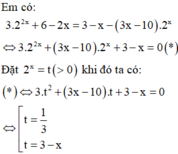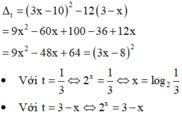2^3x+1=10.2x-2x^x+1

Những câu hỏi liên quan
Phương trình
3.2
2
x
+
6
−
2
x
3
−
x
−
3
x
−
10
.2
x
có tổng các nghiệm là A.
1...
Đọc tiếp
Phương trình 3.2 2 x + 6 − 2 x = 3 − x − 3 x − 10 .2 x có tổng các nghiệm là
A. 1 − log 2 1 3 .
B. 1 + log 2 3.
C. log 2 1 3 .
D. log 2 2 3 .
Đáp án D

Coi là phương trình bậc hai ẩn t, tính ∆ theo biến em có:

Xét hàm số f x = 2 x đồng biến trên − ∞ ; + ∞ , hàm số g x = 3 − x nghịch biến trên − ∞ ; + ∞
Mà f(1) = g(1) => Phương trình có nghiệm duy nhất x = 1
Vậy phương trình (*) có 2 nghiệm => tổng các nghiệm là
1 + log 2 1 3 = log 2 2 + log 2 1 3 = log 2 2 3
Đúng 0
Bình luận (0)
Tích các nghiệm của phương trình
3.4
x
+
3
x
−
10
.2
x
+
3
−
x
0
*
A.
log
2
3
B.
−
log
2
3
C. ...
Đọc tiếp
Tích các nghiệm của phương trình 3.4 x + 3 x − 10 .2 x + 3 − x = 0 *
A. log 2 3
B. − log 2 3
C. 2 log 2 1 3
D. 2 log 2 3
Rút gọn :
1. (2x-5)(3x+1)-(x-3)^2+(2x+5)^2-(3x+1)^3
2. (2x-1)(2x+1)-3x-2)(2x+3)-(x-1)^3+(2x+3)^3
3. (x-2)(x^2+2x+4)-(3x-2)^3+(3x-4)^2
4. (7x-1)(8x+2)-(2x-7)^2-(x-4)^3-(3x+1)^3
5. (5x-1)(5x+1)-(x+3)(x^2-3x+9)-(2x+4)^2-(3x-4)^2+(2x-5)^3
6. (4x-1)(x+2)-(2x+5)^2-(3x-7)^2+(2x+3)^3=(3x-1)^3
1: \(=6x^2+2x-15x-5-x^2+6x-9+4x^2+20x+25-27x^3-27x^2-9x-1\)
=-27x^3-18x^2+4x+10
2: =4x^2-1-6x^2-9x+4x+6-x^3+3x^2-3x+1+8x^3+36x^2+54x+27
=7x^3+37x^2+46x+33
5:
\(=25x^2-1-x^3-27-4x^2-16x-16-9x^2+24x-16+\left(2x-5\right)^3\)
\(=8x^3-60x^2+150-125+12x^2-x^3+8x-60\)
=7x^3-48x^2+8x-35
Đúng 0
Bình luận (0)
b1:
[4+2x]=-3x [3x-1]+2=x
[x+15]+1=3x [2x-5]+x=2
b2:
[2x-5]=x+1 [3x-2]-1=x
[3x-7]=2x+1 [2x-1]+1=x
1) |2x - 1| 52) |2x - 1| |x + 5|3) |3x + 1| x - 2 4) |3 - 2x| x + 2 5) |2x - 1| 5 - x 6) |- 3x| x - 2 7) |2 - 3x| 2x + 1 8) |2x - 1| + |4x ^ 2 - 1| 0 9) (2x + 5)/(x + 3) + 1 4/(x ^ 2 + 2x - 3) - (3x - 1)/(1 - x) 10) (x - 1)/(x + 3) - x/(x - 3) (7x - 3)/(9 - x ^ 2) 11) 5 + 96/(x ^ 2 - 16) (2x - 1)/(x + 4) + (3x - 1)/(x - 4) 12) (2x)/(2x - 1) + x/(2x + 1) 1 + 4/((2x - 1)(2x + 1)) 13) (x + 2)/(x - 2) - 1/x 2/(x ^ 2 - 2x) 14) x/(2x - 6) + x/(2x + 2) (2x + 4)/(x ^ 2 - 2x - 3)
Đọc tiếp
1) |2x - 1| = 5
2) |2x - 1| = |x + 5|
3) |3x + 1| = x - 2
4) |3 - 2x| = x + 2
5) |2x - 1| = 5 - x
6) |- 3x| = x - 2
7) |2 - 3x| = 2x + 1
8) |2x - 1| + |4x ^ 2 - 1| = 0
9) (2x + 5)/(x + 3) + 1 = 4/(x ^ 2 + 2x - 3) - (3x - 1)/(1 - x)
10) (x - 1)/(x + 3) - x/(x - 3) = (7x - 3)/(9 - x ^ 2)
11) 5 + 96/(x ^ 2 - 16) = (2x - 1)/(x + 4) + (3x - 1)/(x - 4)
12) (2x)/(2x - 1) + x/(2x + 1) = 1 + 4/((2x - 1)(2x + 1))
13) (x + 2)/(x - 2) - 1/x = 2/(x ^ 2 - 2x)
14) x/(2x - 6) + x/(2x + 2) = (2x + 4)/(x ^ 2 - 2x - 3)
d) (3x – 5)(7 – 5x) – (5x + 2)(2 – 3x) = 4 g) 3(2x - 1)(3x - 1) - (2x - 3)(9x - 1) =0 j) (2x – 1)(3x + 1) – (4 – 3x)(3 – 2x) = 3 k) (2x + 1)(x + 3) – (x – 5)(7 + 2x) = 8 m) 2(3x – 1)(2x + 5) – 6(2x – 1)(x + 2) = - 6
g: Ta có: \(3\left(2x-1\right)\left(3x-1\right)-\left(2x-3\right)\left(9x-1\right)=0\)
\(\Leftrightarrow3\left(6x^2-5x+1\right)-\left(18x^2-29x+3\right)=0\)
\(\Leftrightarrow18x^2-15x+3-18x^2+29x-3=0\)
\(\Leftrightarrow14x=0\)
hay x=0
Đúng 0
Bình luận (1)
a) x\(^2\)-3x+7=1+2x
b) x\(^2\)-3x-10=0
c) x\(^2\)-3x+4=2(x-1)
d) (x+1)(x-2)(x-5)=0
e) 2x\(^2\)+3x+1=0
f) 4x\(^2\)-3x=2x-1
a) Ta có: \(x^2-3x+7=1+2x\)
\(\Leftrightarrow x^2-3x+7-1-2x=0\)
\(\Leftrightarrow x^2-3x-2x+6=0\)
\(\Leftrightarrow x\left(x-3\right)-2\left(x-3\right)=0\)
\(\Leftrightarrow\left(x-3\right)\left(x-2\right)=0\)
\(\Leftrightarrow\left[{}\begin{matrix}x-3=0\\x-2=0\end{matrix}\right.\Leftrightarrow\left[{}\begin{matrix}x=3\\x=2\end{matrix}\right.\)
Vậy: S={3;2}
b) Ta có: \(x^2-3x-10=0\)
\(\Leftrightarrow x^2-5x+2x-10=0\)
\(\Leftrightarrow x\left(x-5\right)+2\left(x-5\right)=0\)
\(\Leftrightarrow\left(x-5\right)\left(x+2\right)=0\)
\(\Leftrightarrow\left[{}\begin{matrix}x-5=0\\x+2=0\end{matrix}\right.\Leftrightarrow\left[{}\begin{matrix}x=5\\x=-2\end{matrix}\right.\)
Vậy: S={5;-2}
c) Ta có: \(x^2-3x+4=2\left(x-1\right)\)
\(\Leftrightarrow x^2-3x+4=2x-2\)
\(\Leftrightarrow x^2-3x+4-2x+2=0\)
\(\Leftrightarrow x^2-3x-2x+6=0\)
\(\Leftrightarrow x\left(x-3\right)-2\left(x-3\right)=0\)
\(\Leftrightarrow\left(x-3\right)\left(x-2\right)=0\)
\(\Leftrightarrow\left[{}\begin{matrix}x-3=0\\x-2=0\end{matrix}\right.\Leftrightarrow\left[{}\begin{matrix}x=3\\x=2\end{matrix}\right.\)
Vậy: S={3;2}
d) Ta có: \(\left(x+1\right)\left(x-2\right)\left(x-5\right)=0\)
\(\Leftrightarrow\left[{}\begin{matrix}x+1=0\\x-2=0\\x-5=0\end{matrix}\right.\Leftrightarrow\left[{}\begin{matrix}x=-1\\x=2\\x=5\end{matrix}\right.\)
Vậy: S={-1;2;5}
e) Ta có: \(2x^2+3x+1=0\)
\(\Leftrightarrow2x^2+2x+x+1=0\)
\(\Leftrightarrow2x\left(x+1\right)+\left(x+1\right)=0\)
\(\Leftrightarrow\left(x+1\right)\left(2x+1\right)=0\)
\(\Leftrightarrow\left[{}\begin{matrix}x+1=0\\2x+1=0\end{matrix}\right.\Leftrightarrow\left[{}\begin{matrix}x=-1\\2x=-1\end{matrix}\right.\Leftrightarrow\left[{}\begin{matrix}x=-1\\x=\dfrac{-1}{2}\end{matrix}\right.\)
Vậy: \(S=\left\{-1;\dfrac{-1}{2}\right\}\)
f) Ta có: \(4x^2-3x=2x-1\)
\(\Leftrightarrow4x^2-3x-2x+1=0\)
\(\Leftrightarrow4x^2-5x+1=0\)
\(\Leftrightarrow4x^2-4x-x+1=0\)
\(\Leftrightarrow4x\left(x-1\right)-\left(x-1\right)=0\)
\(\Leftrightarrow\left(x-1\right)\left(4x-1\right)=0\)
\(\Leftrightarrow\left[{}\begin{matrix}x-1=0\\4x-1=0\end{matrix}\right.\Leftrightarrow\left[{}\begin{matrix}x=1\\4x=1\end{matrix}\right.\Leftrightarrow\left[{}\begin{matrix}x=1\\x=\dfrac{1}{4}\end{matrix}\right.\)
Vậy: \(S=\left\{1;\dfrac{1}{4}\right\}\)
Đúng 3
Bình luận (1)
Bài 2 Tìm x biết 1, (2x-2).(3x+1)-(3x-2).(2x-3)=5 2,(1-3x).(3x-5)-(2x-4)(2-3x)=x-6 3,(2x-1).(4x^2+2x+1)-(2x+1)(4x^2-2x+1)=5x+6 Giúp tớ với
Rút gọn biểu thức:
a) (x 2 – 2x + 2)(x 2 – 2)(x 2 + 2x + 2)(x 2 + 2)
b) (x + 1)2 – (x – 1)2 + 3x 2 – 3x(x + 1)(x – 1)
c) (2x + 1)2 + 2(4x 2 – 1) + (2x – 1)2
d) (m + n)2 – (m – n)2 + (m – n)(m + n)
e) (3x + 1)2 – 2(3x + 1)(3x + 5) + (3x + 5)2
a: Ta có: \(\left(x^2-2x+2\right)\left(x^2-2\right)\left(x^2+2x+2\right)\left(x^2+2\right)\)
\(=\left(x^4-4\right)\left[\left(x^2+2\right)^2-4x^2\right]\)
\(=\left(x^4-4\right)\left(x^4+4x^2+4-4x^2\right)\)
\(=\left(x^4-4\right)\cdot\left(x^4+4\right)\)
\(=x^8-16\)
b: Ta có: \(\left(x+1\right)^2-\left(x-1\right)^2+3x^2-3x\left(x+1\right)\left(x-1\right)\)
\(=x^2+2x+1-x^2+2x-1+3x^2-3x\left(x^2-1\right)\)
\(=3x^2+4x-3x^3+3x\)
\(=-3x^3+3x^2+7x\)
Đúng 0
Bình luận (0)














